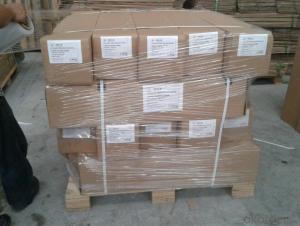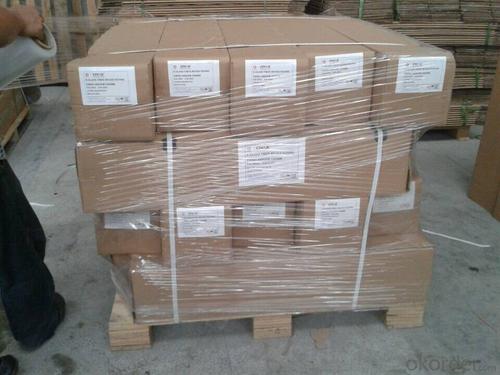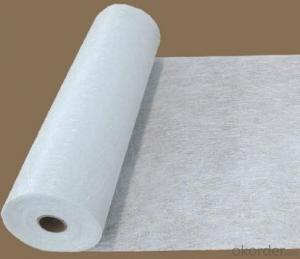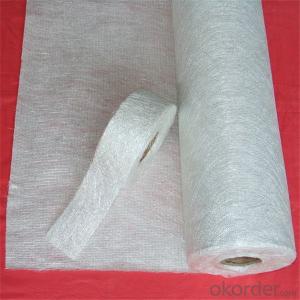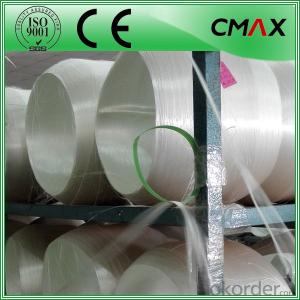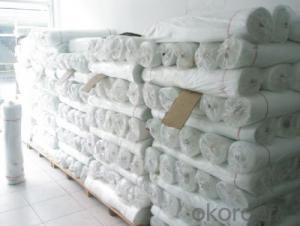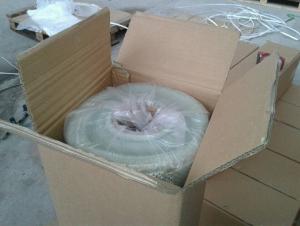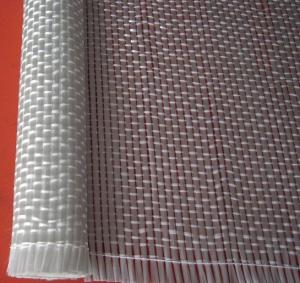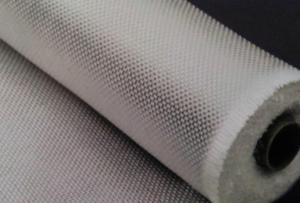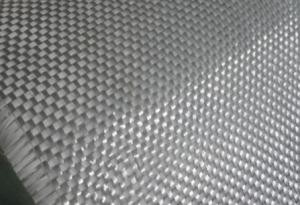E-Glass/C Glass Fiberglass Mat Tissue Woven Roving
- Loading Port:
- Shanghai
- Payment Terms:
- TT or LC
- Min Order Qty:
- 16000 kg
- Supply Capability:
- 160000Kg Per Month kg/month
OKorder Service Pledge
OKorder Financial Service
You Might Also Like
1.Brief Introduction
Woven Rovings are compatible with unsaturated polyester, vinyl ester, epoxy and phenolic resins.
Woven Rovings are a high-performance reinforcement widely used in hand lay up and robot processes to manufacture boats, vessels, plane and automotive parts, furniture and sports facilities.
2.Product Features
Warp and weft rovings aligned in a parallel and flat manner, resulting in uniform tension
Densely aligned fibers, resulting in high dimensional stability and making handling easy
Good moldability, fast and complete wet out in resins, resulting in high productivity
3.Product Specifications
Property | Area Weight | Moisture Content | Size Content | Width |
(%) | (%) | (%) | (mm) | |
Test Method | IS03374 | ISO3344 | ISO1887 | |
EWR200 | ±7.5 | ≤0.15 | 0.4-0.8 | 20-3000 |
EWR270 | ||||
EWR300 | ||||
EWR360 | ||||
EWR400 | ||||
EWR500 | ||||
EWR600 | ||||
EWR800 |
Special specification can be produce according to customer requirements.
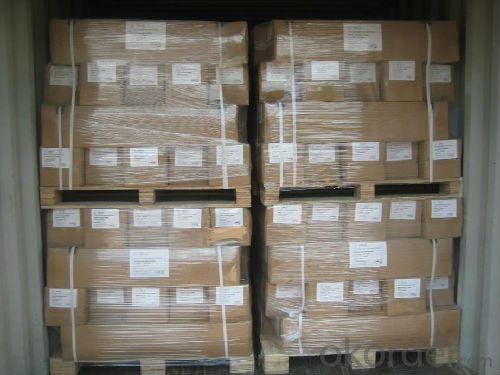
4.FAQ
Packaging:
Each woven roving is wound onto a paper tube which has an inside diameter of 76mm and the mat roll has a diameter of 220mm. The woven roving roll is wrapped up with plastic film,and then packed in a cardboard box or wrapped up with kraft paper. The rolls can be horizontally placed. For transportation, the rolls can be loaded into a cantainer directly or on pallets.
- Q: Is fiberglass mat tissue suitable for underground applications?
- Yes, fiberglass mat tissue is suitable for underground applications. It is commonly used in underground construction projects due to its excellent strength, durability, and resistance to water and corrosion. Additionally, fiberglass mat tissue provides insulation and reinforcement, making it ideal for underground applications such as tunnels, basements, and pipelines.
- Q: Can fiberglass mat tissue be used for reinforcing fiberglass pools?
- Yes, fiberglass mat tissue can be used for reinforcing fiberglass pools. It helps enhance the strength and durability of the pool structure by providing added reinforcement to the fiberglass layers.
- Q: Can fiberglass mat tissue be used for making insulation blankets?
- Yes, fiberglass mat tissue can be used for making insulation blankets. Fiberglass mat tissue is a lightweight and flexible material that is commonly used in insulation applications. It offers excellent thermal insulation properties, as well as resistance to fire, moisture, and chemicals. Additionally, fiberglass mat tissue is easy to handle and install, making it an ideal choice for creating insulation blankets that can be used in various industries, such as construction, automotive, and aerospace.
- Q: Does fiberglass mat tissue require any special precautions during storage?
- Special precautions are necessary when storing fiberglass mat tissue. Fiberglass is a delicate material that can easily be damaged if not stored correctly. Here are some precautions to keep in mind: 1. Maintain dry conditions: It is important to store fiberglass mat tissue in a dry, moisture-free environment. Excessive moisture can compromise its strength and integrity. 2. Avoid direct exposure to sunlight: The UV rays from sunlight can gradually degrade fiberglass. To prevent damage, store the material in a cool, shaded area away from direct sunlight. 3. Shield from dust and dirt: To maintain its effectiveness, fiberglass mat tissue should be stored in a clean, dust-free environment. Dust and dirt particles can become embedded in the material and reduce its efficiency. 4. Steer clear of extreme temperatures: Extreme heat or cold can also have an impact on the quality of fiberglass mat tissue. It is advisable to store it in an environment with controlled temperatures to prevent any potential damage. 5. Proper packaging: If the fiberglass mat tissue comes with packaging, it is recommended to keep it in its original packaging for added protection. If not, consider using a durable, moisture-resistant wrapping material. By adhering to these precautions, you can ensure that your fiberglass mat tissue remains in optimal condition during storage and is ready for use whenever necessary.
- Q: Can fiberglass mat tissue be used for aerospace applications?
- Yes, fiberglass mat tissue can be used for aerospace applications. It is commonly used as a reinforcing material in the aerospace industry due to its excellent mechanical properties, such as high strength-to-weight ratio and resistance to corrosion. Additionally, fiberglass mat tissue can provide thermal insulation and fire resistance, making it suitable for various aerospace components, including aircraft interiors, panels, and structural parts.
- Q: Can fiberglass mat tissue be used for insulation in cold environments?
- Yes, fiberglass mat tissue can be used for insulation in cold environments. Fiberglass is a common material used for insulation due to its excellent thermal properties. It has a low thermal conductivity, meaning it can effectively resist the transfer of heat, thus providing insulation in cold environments. Fiberglass mat tissue is specifically designed to provide thermal insulation and is commonly used in applications such as walls, roofs, and floors to prevent heat loss and maintain a comfortable temperature indoors. Additionally, fiberglass is resistant to moisture and does not easily degrade or lose its insulating properties in cold and damp conditions, making it a suitable choice for insulation in cold environments.
- Q: Can fiberglass mat tissue be used for insulation purposes?
- Yes, fiberglass mat tissue can be used for insulation purposes. It is commonly used as a layer in insulation systems to provide thermal resistance and enhance the overall insulation performance.
- Q: What are the different types of fiberglass mat tissue available?
- There are several different types of fiberglass mat tissues available, each with its own unique characteristics and applications. Some of the most common types include: 1. Chopped Strand Mat (CSM): This is the most basic and widely used type of fiberglass mat tissue. It consists of randomly oriented chopped strands of fiberglass held together with a binder. CSM is typically used in applications where strength and resilience are important, such as boat building and automotive parts manufacturing. 2. Continuous Filament Mat (CFM): Unlike CSM, CFM is made from continuous strands of fiberglass that are woven into a mat. This type of fiberglass mat tissue offers excellent tensile strength and dimensional stability, making it ideal for applications that require high strength and stiffness, such as aerospace components and wind turbine blades. 3. Surface Veil Mat: Surface veil mat is a very thin and lightweight type of fiberglass mat tissue that is used primarily for surface finishing and reinforcement. It is typically applied as a final layer in composite laminates to improve the surface smoothness and water resistance. 4. Stitched Mat: Stitched mat is made by interweaving continuous strands of fiberglass with a stitching thread. This construction provides increased strength and improved drapability, making it easier to conform to complex shapes. Stitched mat is commonly used in applications that require a combination of strength and flexibility, such as in the production of pipes and tanks. 5. Binderless Mat: Binderless mat is a specialty type of fiberglass mat tissue that does not contain any binders or resins. Instead, the fibers are mechanically bonded together using a needling process. This makes binderless mat highly resistant to chemical attack and suitable for use in corrosive environments, such as chemical storage tanks and pipes. These are just a few examples of the different types of fiberglass mat tissues available. The choice of which type to use depends on the specific requirements of the application, including strength, flexibility, surface finish, and resistance to various environmental factors.
- Q: How does the porosity of fiberglass mat tissue affect its performance?
- The porosity of fiberglass mat tissue plays a significant role in determining its performance. Porosity refers to the density of tiny pores or holes in the material, which affects the material's ability to absorb and hold fluids, as well as its strength and durability. Firstly, the porosity of fiberglass mat tissue influences its absorption capability. A higher porosity allows the tissue to absorb more fluids, such as resins or binders, during the manufacturing process. This absorption is crucial as it ensures better adhesion between the fiberglass mat and the bonding material, resulting in a stronger and more durable end product. Secondly, the porosity of the fiberglass mat tissue affects its strength and stiffness. Lower porosity generally indicates higher density and a more tightly packed structure, resulting in increased strength and stiffness. This is beneficial in applications where the material needs to withstand high mechanical stresses or act as a structural component. Additionally, the porosity of the fiberglass mat tissue impacts its thermal and acoustic insulation properties. Higher porosity typically leads to better thermal and acoustic insulation due to the increased number of air pockets within the material. These air pockets act as barriers, reducing heat transfer and sound transmission, making the material suitable for applications requiring thermal or acoustic insulation. Furthermore, the porosity of fiberglass mat tissue can influence its filtration capabilities. If the material has a high porosity, it can trap and hold particles more effectively, making it suitable for use in filtration systems. Conversely, a low porosity may allow for better flow rates, making it more suitable for applications where fluid permeability is important, such as drainage applications. In summary, the porosity of fiberglass mat tissue affects its performance in various ways. It determines its absorption capability, strength, stiffness, thermal and acoustic insulation properties, filtration capabilities, and fluid permeability. Therefore, understanding and controlling the porosity of fiberglass mat tissue is essential to ensure optimal performance in a wide range of applications.
- Q: Can fiberglass mat tissue be used for repairing fiberglass fenders?
- Yes, fiberglass mat tissue can be used for repairing fiberglass fenders. Fiberglass mat tissue is a versatile material that is commonly used in fiberglass repair work. It is often used as a reinforcement layer to add strength and durability to the repaired area. When repairing fiberglass fenders, the damaged or cracked area can be repaired by applying a layer of resin and then laying the fiberglass mat tissue over it. The mat tissue is then saturated with additional resin to create a strong bond and ensure a smooth finish. This process helps to restore the structural integrity of the fender and provide a seamless repair. However, it is important to note that the success of the repair depends on the extent of the damage and the skill of the person performing the repair.
Send your message to us
E-Glass/C Glass Fiberglass Mat Tissue Woven Roving
- Loading Port:
- Shanghai
- Payment Terms:
- TT or LC
- Min Order Qty:
- 16000 kg
- Supply Capability:
- 160000Kg Per Month kg/month
OKorder Service Pledge
OKorder Financial Service
Similar products
Hot products
Hot Searches
Related keywords
